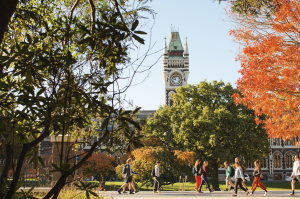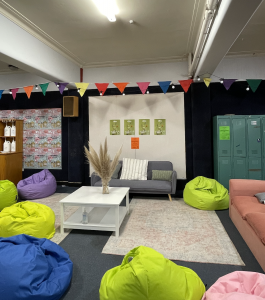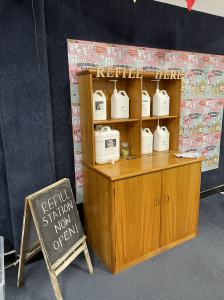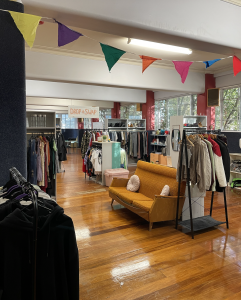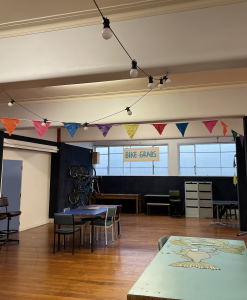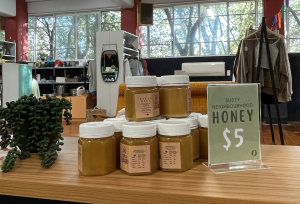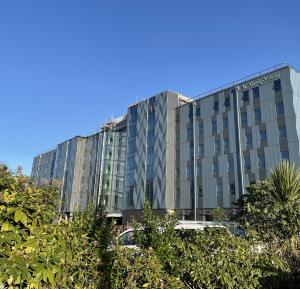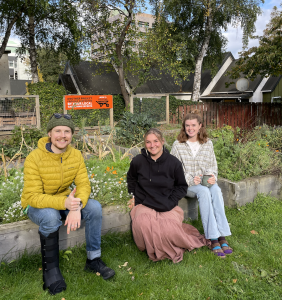Through the reuse of materials and products, from honey to bicycles, a circular economy has been successfully established within the walls of Otago University’s Dunedin Campus.
It only takes a short walk through the University of Otago campus (we like to call it ‘the Sustainability Walk’) to see the success that is possible when sustainability is at the forefront of collective action.
The current limiting of waste, regeneration of materials and other initiatives in operation pave the path for a more sustainable future, demonstrating the possibilities and positive impact of a circular economy in action!
Te Oraka: Thrift, Swap, Refill and Grab!
Te Oraka, the University of Otago’s on campus thrift store, was first sustainable initiative visited – and when we say this place is impressive, we really mean it! Located on 96 Anzac Avenue, Te Oraka is a hidden gem for Otago’s student population, with a purpose for greater sustainability on campus.
Te Oraka is a community driven, positive space – there’s an area decorated with bean bags, comfy chairs and a projector, which hosts student community film screenings. There’s a refill station equipped with dishwashing, laundry liquid and body wash, aiming to diminish waste and support students.
There’s a ‘Drop & Swap,’ where you can shop for new clothes or household items and pay or exchange with your second-hand items. Lastly, there’s the ‘Bike Grab’, which collects second-hand bikes for student use to encourage different modes of travel around campus.
The shop further hosts ‘repair café’ workshops, teaching students how to repair clothing, among other sustainably minded practices, aimed at giving items a second life. Te Oraka further has household items, such as kitchenware and furniture, all with an aim to ease the consumption that accompanies a new flatting year, minimising waste and encouraging second-hand purchasing.
Te Oraka even sells their own honey! Produced by bees within the Sustainability Neighbourhood and residential colleges Aquinas, Arana, Toroa and Carrington, the honey is processed and collected by a local apiarist, Otto. The honey is then bought back at cost and sold to the university community, supplied back to the neighbourhood and college kitchens, sustaining a circular economy within the University.
“When the students are putting honey on their toast in the morning, it was collected by the bees in the garden of the college where they live… it’s trying to create more of a sense of place, a sense of belonging.” – Ray O’Brien, Head of Sustainability
Winners of the student engagement category at the 2022 Australasian Green Gown Awards (which includes entry to the global awards), Te Oraka’s practices represent the circular economy possible from recycling, re-using and re-investing funds into sustainable practices and products. Te Oraka further functions as a ‘living lab’, meaning their sustainable practices showcase what could be introduced on a larger scale within the University.
“One of the core ways that we are going to make a difference is by engaging more and more students, because every student we engage with, often lives a long productive life of leading change as they go… which is why things like Te Oraka and the Sustainability Neighbourhood are so core to what we do.” – Ray O’Brien, Head of Sustainability
Te Oraka is absolutely worth a visit and is the perfect place to collect a variety of flatting goods, clothing and furniture, all while incorporating sustainable practices into your daily life. Purchased flatting goods can be later returned, thus contributing to the circular flow of sustainability, and reducing waste.
Open: Tuesdays and Thursdays between 11am and 1pm, operated by the Sustainability office.
Te Rangihīroa Residential College (Open for applications for 2024)
Our second stop was Te Rangihīroa, a large and visually impressive residential college with sustainable aims. The college is named after Te Rangihīroa, the first Māori medical graduate from a New Zealand University. Te Rangihīroa is remembered as a leader and a doctor who dedicated his life to servicing the Māori community, and the heath issues that impacted this community in the early twentieth century. The college has been designed with input from Te Rangihīroa’s Ngāti Mutunga iwi and local Ngāi Tahu.
When completed, Te Rangihīroa will qualify as a 5-Star Greenstar building, which is deemed New Zealand excellence and is built with sustainable practice and purpose. Green Star certification functions to holistically analyse building performance and environmental impact.
Te Rangihīroa will have 150 ensuite bedrooms, and house 450 University of Otago residents. It features a spacious dining room, music and media rooms, study spaces and social spaces. Applications for the college (located on 15 Forth Street) open on 1 August 2023.
Iwi
Noun New Zealand
A Māori community or people.
Ngāti Mutunga
One of eight generally recognised iwi of Taranaki.
Ngāi Tahu
The principal Māori iwi of the South Island
The Carpark Living Lab
Otago University’s dedication to the incorporation of sustainability ventures within the institution itself, looking at issues such as carparking, the space these take up, and how we can an encourage alternative modes of travel, reducing community emissions.
The Albany Street Staff Carpark is an example of smaller sustainable changes that could be incorporated on a larger scale within the University community. The carpark will feature an electric bike charging station and a park-swapping system.
Albany Street is currently under a project of reconstruction with a bike lane and larger bus stops being installed.
“Students wise, we’ve got about 80% of our undergrads within a few kilometres of campus (…) senior students start to move further away, but even with staff we have around 80% living within five kilometres of campus.
We have some challenging terrain and sometimes some challenging weather as well so this living lab is about figuring out how can we make that shift to more sustainable practices (…) how we can unlock people from being car commuters…” – Ray O’Brien, Head of Sustainability
A carparking system through a phone application that allows carpark users to rent out their spots, is the tool to supporting more sustainable modes of travel, believes O’Brien, allowing car users flexibility. There will further be an electric scooter rack, while the overall carpark will function as a living lab, heavily incorporating student learning.
The carpark is located on 99 Albany Street.
The Sustainability Neighbourhood
The final stop of our walk was the Sustainability Neighbourhood, which offers the Otago flatting experience with an added focus on sustainability. The Sustainability Neighbourhood is comprised of a group of flats set up to encourage and establish environmentally conscious living practices, set up to allow residents to grow food, compost, recycle, be energy efficient, and lead active healthy lives.
Within the Sustainability Neighbourhood, residents are inspired to live their values through creating monthly huis, so far having a waste management expert visiting and teaching the residents about recycling and minimising waste, alongside advice on gardening.
The Neighbourhood currently houses many international students, which is highly beneficial says Demi Lawrence, the Student Lead of the Sustainability Office, with students from all walks of life offering knowledge and advise on a common sustainable cause. The Neighbourhood has a bike rack, vegetable garden, greenhouse, composting station, beehives, a worm farm, and high-quality University-owned flats.
Students can engage in a range of activities, including growing and eating their own food.
If you’re dedicated to sustainable living practices, willing to contribute and looking for a like-minded community, the Sustainability Neighbourhood is for you. The Neighbourhood is a space of embodying values through action and sets out to make a larger difference as a ‘living lab,’ which is believed to have a widespread impact on the student flatting scene.
Hui
Noun
(in New Zealand) a large social or ceremonial gathering.
The ‘Sustainability Walk’ is a truly inspiring example of what is possible at the University of Otago, in an environment that fosters learning, growth and community. The shared values of sustainability across campus at several levels, alongside the successful circular economy, showcase the university’s commitment to sustainable practices, and hold with them the promise of a greener future.
The University of Otago is ranked 63rd in the global Times Higher Education (THE) Impact Rankings 2023. The rankings measure universities internationally to evaluate their performances against the United Nations’ Sustainable Development Goals (SDGS).
Interested in sustainability at Otago?
Incorporate climate change perspectives into your degree!
Subjects and courses available for international students
Check out the Sustainability Office!

